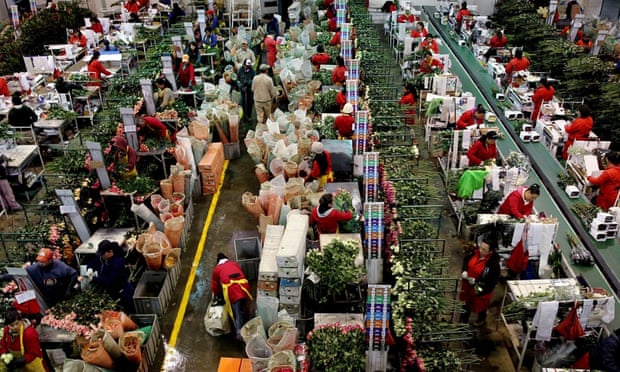Latin America
Related: About this forumThe women suffering for your Valentine's Day flowers
The women suffering for your Valentine's Day flowers
Behind the millions of imported flowers we buy every year is a mostly female workforce subjected to low pay and poor conditions
Oliver Balch
Thursday 12 February 2015 12.51 EST

[font size=1]
Colombia is currently the second largest producer of flowers in the world.
Photograph: LEONARDO MUNOZ/EPA
[/font]
Lydia López González’s day typically starts at 3:30am. That gives the 47-year-old single mother from Facatativá, central Colombia time to make breakfast and lunch for her daughter before leaving for the flower fields at 5am.
“I don’t like leaving her, but what else can I do? Anyway, I’m usually back by 5pm. Many of the other women don’t get home until midnight”, she says.
González is one of tens of thousands of workers in Colombia’s Savanna de Bogotá region working to produce the carnations, roses and other flowers hitting UK shelves this Valentine’s Day. Behind the beautiful bouquets, however, lie worrying reports of poor pay, long hours and other systemic labour abuses.
In recent years, Colombia has emerged as the world’s second largest flower exporter, with plane-loads of freshly-cut flowers leaving for the US, UK, Japan and other markets every day. Exports increased by 4.4% between 2013-2014, according to the Cactus Corporation, a Bogotá-based campaign group, which claims the industry’s US$1.3bn (2012) annual sale revenues are being bought at the cost of workers’ rights.
More:
http://www.theguardian.com/sustainable-business/2015/feb/12/the-women-suffering-for-your-valentines-day-flowers
MADem
(135,425 posts)Colombia stopped using child labor a few years back; Ecuador still exploits children in this industry, though to a lesser extent than previously.
http://www.theatlantic.com/international/archive/2012/02/theres-a-1-in-12-chance-your-v-day-flowers-were-cut-by-child-laborers/253084/
...At least 8.3% of flowers in the U.S. were cut by child laborers in Ecuador, or about one in 12 stems, according to the most recent data. During the school year, 80% of the workers in Ecuador's enormous flower industry are children, according to a 2000 report by the International Labour Organization. That's the most recent data specific to the flower industry, but it may not have changed much; international pressure led Ecuador, in 2005, to launch reforms to reduce child labor, but as of 2010, 13% of the country's children are sill working, often in agriculture.
Far more of our flowers come from Colombia, where, according to the International Labor Rights Forum, "child labor has been successfully eradicated in Colombian flower plantations." Only a decade ago, an alarming State Department report on Colombia found that "children as young as 11 years of age work full time in almost every aspect of the cut flower industry." Though child labor is still a significant problem in coffee and sugarcane, getting children off of Colombia's flower plantations was a real success. What happened?
Believe it or not, a significant share of the credit goes to George W. Bush. In 2006, his administration started working with Colombia on a free trade deal, but he made it about more than just trade. The deal would require that Colombia meet and enforce certain worker's rights standards, including on child labor. Colombia, which for years had resisted pressure to improve worker's conditions, happily agreed. And why not? A free trade would be so great for Colombia's economy that ending child labor, allowing stronger unions, and improving basic services were well worth the trade-off. Congress finally approved the deal last year, and it is expected to go into effect by the end of 2012.
Still, even if the U.S. can push to end child labor on Ecuadorian flower plantations the way it did in Colombia, that won't make the industry much friendlier to its workers. Two-thirds of flower workers in both countries suffer from work-related health problems: mostly things like nausea or impaired vision, but sometimes asthma, birth defects, or even miscarriages. Labor rights organizations cite the industry's use of dangerous pesticides.....
murielm99
(30,778 posts)those of us who love to receive flowers.
This is off-topic, but I love the cute little white doggie in your pic.
MADem
(135,425 posts)economies of the countries in question--but when children are being exploited, or women are forced to work bent over in flower fields for low pay, it takes the joy from the blooms, doesn't it?
The dog is a west highland white terrier--they are the coolest dogs. They are smart, companionable, loving, and feisty--they have minds of their own. They also enjoy a nice walk and like to play as well. I think they can communicate through telepathy--at least, mine can!